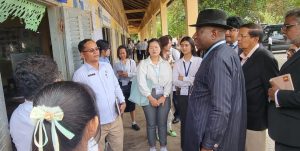Among observers at Cambodia’s national election on Sunday was former Nigerian President Goodluck Jonathan, who billed his trip as having the dual purpose of election observing and attending an “International Leadership Conference on Democracy, Peace, and Development.”
Cambodia’s 2023 election replicated that of 2018 in lacking a recognized opposition party, with opponents of Prime Minister Hun Sen this time urging voters to spoil their ballot papers to voice their dissent. The United States, the European Union, and Japan declined to send observers, while the banned opposition Candlelight Party claimed that vote counting by the country’s National Election Committee took place behind closed doors.
Jonathan, president of Nigeria from 2010 to 2015, is not entirely without democratic credentials. He stood down peacefully after his defeat in 2015, an outcome that Hun Sen has never been willing to contemplate. But his legacy is marred by allegations of corruption. Two oil majors, Italy’s Eni and Royal Dutch Shell, were accused of paying over $1 billion in bribes to members of his administration for rights to Nigeria’s OPL245 offshore oilfield as part of a 2011 agreement.
The U.S. and the Netherlands opened investigations into the claims, but dropped the case when Italy took it over. Authorities in Italy have absolved both the multinationals. Transparency International has urged the U.S. to reopen the case, and argues that the Italian enforcement of anti-foreign bribery laws is flawed.
Jonathan, according to his Facebook page, arrived in Cambodia on July 20, three days before the election. There is no visible trace of him having gone to Cambodia previously, though he has been making upbeat comments complete with user-friendly photos on social media. He was pictured at a reception hosted by Hun Sen, two seats to the Cambodian leader’s left, wearing his trademark black hat.
The European Platform for Democratic Elections lays down a set of criteria that can be used to identify whether election observers are real or fake. These include whether they publish preliminary and final reports on their methods and whether their activities are limited to short-term or stand-alone observation. They also include whether comments are made to the media during the election about their activities, and whether their travel and accommodation costs are paid by political actors in the host country.
“We will be glad to witness the good people of this great country exercise this democratic right on Sunday, to elect the leaders of their choice for the next governance cycle in Cambodia,” Jonathan was quoted as saying by the government-controlled Khmer Times before the election. The Diplomat has contacted his office to ask about his observation methodology, his plans for publishing his findings, and how his trip to Cambodia was funded, but has not received a reply.
The point is more important than the question of whether such trips are more than simple junkets. The danger is that the role of the “observer” is being blurred to include any foreign dignitary who can be persuaded to come along at the time of a flawed election. At the very least, election “observers” should visit a country for that exclusive purpose, rather than tacking on conferences and meetings with heads of government. Neutral and independent international election observers have everything to gain by sharply distinguishing their work from “observers” who do not make any visible attempt to report objectively on the elections which they attend.
Jonathan was defeated in Nigeria’s 2015 election by Mohammadu Buhari, a former military ruler who ran on an anti-corruption platform and has denied claims made by the Buhari regime that his government was corrupt. The British newspaper The Guardian has reported that the political consultancy Cambridge Analytica, since forced into closure, worked with private Israeli hacking and disinformation specialists to steal data from Buhari in an unsuccessful attempt to get Jonathan re-elected. The newspaper said there was no evidence that Jonathan was aware of the plan.
Since leaving office, Jonathan has been busy in his observer role, visiting Mozambique and Kenya for the elections of 2019 and 2022. The results of both were contested by the opposition. The Kenyan election passed off more peacefully than had been expected, while in Mozambique, there were claims of massive intimidation of the opposition.
In June this year, Jonathan observed the election in Sierra Leone which returned President Julius Maada Bio for a second term. The results were rejected by the opposition All People’s Congress. The EU Observation Mission in Sierra Leone pointed to “statistical inconsistencies” in the results while the U.S. and several EU countries said they were concerned about a lack of transparency in vote counting.
Goodluck will be off again to Liberia in West Africa for elections in October. As far as his methods can be deduced, they seem to revolve around increasing the credibility of elections, rather than assessing whether they are free and fair. “We are grateful for the opportunity to work with Liberians in building the confidence and consensus towards peaceful, transparent, and credible general elections in October 2023,” he tweeted on July 11. Those who contest what they see as flawed election processes don’t seem to figure on his agenda.

































